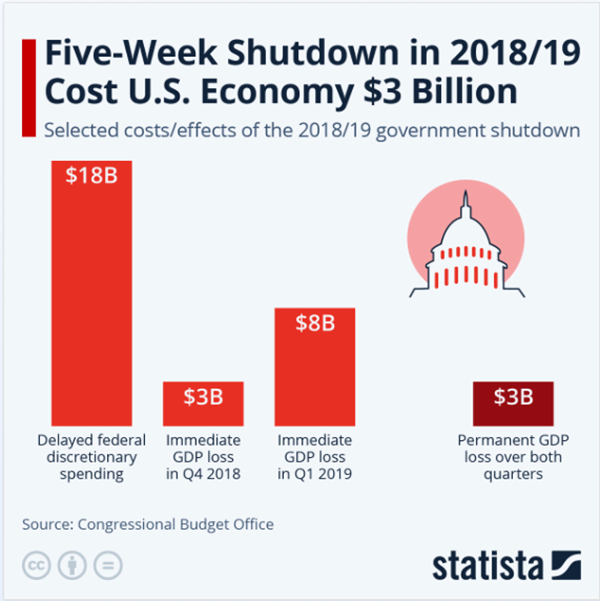Economic Impact of the 2018-2019 Federal Government Shutdown and Looming Budget Standoff

A five-week partial shutdown of federal government operations from December 2018 to January 2019 reduced U.S. economic output by an estimated $3 billion, based on reports from nonpartisan government analysts. The shutdown caused significant disruptions, including work stoppages for federal employees, delayed government payments, and lower consumer spending. Over the course of the closure, the economy experienced an $11 billion short-term decline. Once the government reopened on January 25, about $8 billion of those losses were recovered as operations resumed. During the shutdown, federal spending was delayed by roughly $18 billion. Of this, $3 billion represented lost wages for employees who could not work, which is not expected to be recovered. Another $6 billion was due to delayed pay for essential workers, which was later paid out. The remaining $9 billion reflected postponed federal purchases of goods and services, some of which were eventually recovered after agencies reopened.
As of September 30, Congress had not approved key funding measures or reached an agreement on a stopgap bill to keep the government operating through late November. With deadlines approaching to finalize fiscal legislation for 2025 and 2026, lawmakers may need to pass a temporary spending bill to avoid another government shutdown after midnight on Wednesday. However, ongoing disagreements—particularly related to healthcare policy—are slowing negotiations. Although the Republican Party has a slim majority in the Senate, it does not have enough votes on its own to pass the necessary spending bills.
Sources
- Congressional Budget Office analysis:
https://www.cbo.gov/publication/54937/ - 2018/2019 government shutdown overview and impacts:
https://www.statista.com/topics/5085/2019-us-government-shutdown/ - Status of current government shutdown discussions:
https://edition.cnn.com/2023/09/28/politics/shutdown-latest-government-funding/index.html - Information on the U.S. Congress:
https://www.statista.com/topics/10404/us-congress/
Disclaimer
The information provided in this article is intended for educational and informational purposes only and does not constitute legal, tax, accounting, or investment advice. It should not be construed as personalized advice tailored to your individual circumstances. None of the content should be relied upon as the sole basis for making any financial or tax-related decisions.
Tax laws, rules, and regulations are subject to change and may vary by jurisdiction. The application of tax laws to individual situations can be complex and may depend on your specific facts and circumstances. As such, you should consult with qualified professionals, including a certified public accountant (CPA), tax attorney, or financial advisor, before taking any action based on the information provided.
Past performance is not indicative of future results. All investment and tax strategies carry risks, including the potential loss of principal or adverse tax consequences. Neither the author, publisher, nor any affiliated entities assume any responsibility or liability for any errors or omissions, or for the results obtained from the use of this information.
This content is not a solicitation to buy or sell any securities, products, or services. Any references to specific products, services, or investment opportunities are not endorsements or recommendations. You should carefully consider your investment objectives, risk tolerance, and personal financial situation before investing.
By accessing this content, you agree that you are solely responsible for your own decisions and outcomes. The author and publisher expressly disclaim any liability arising from the use of the information contained herein.












